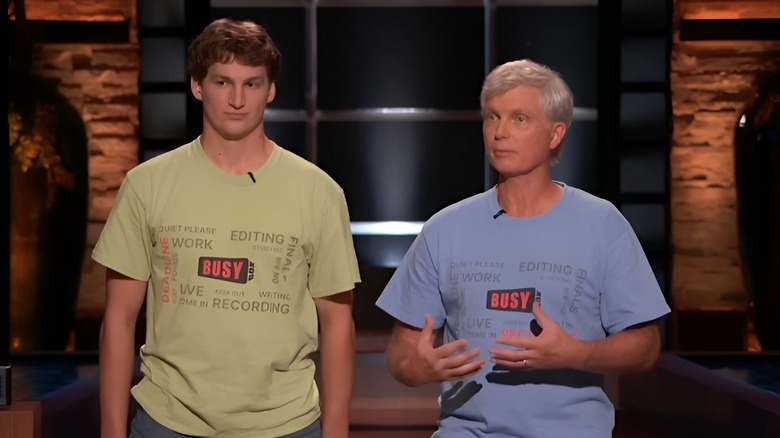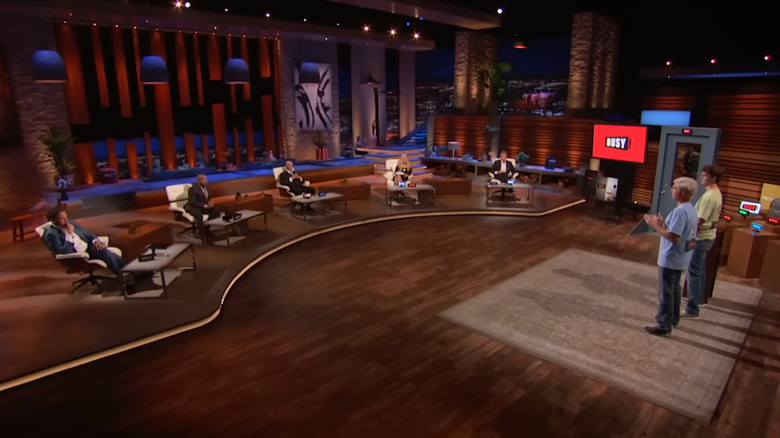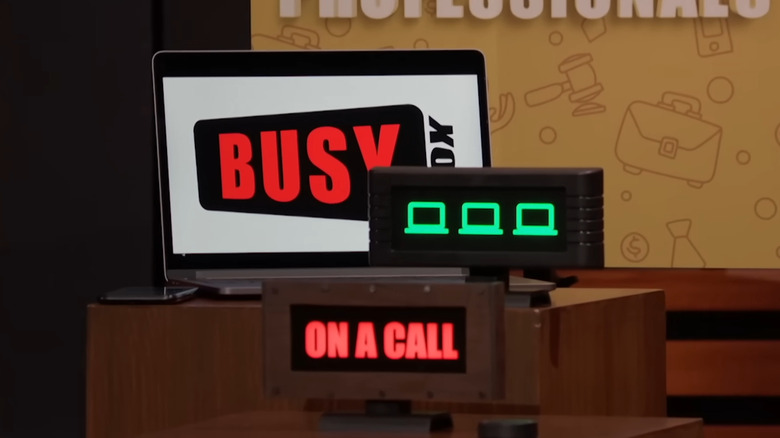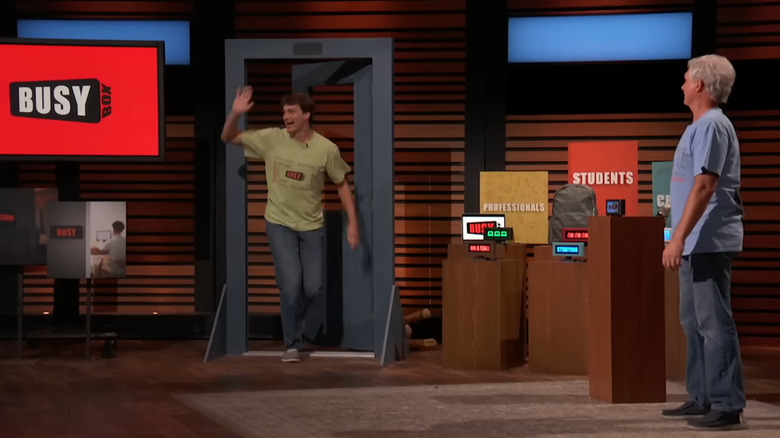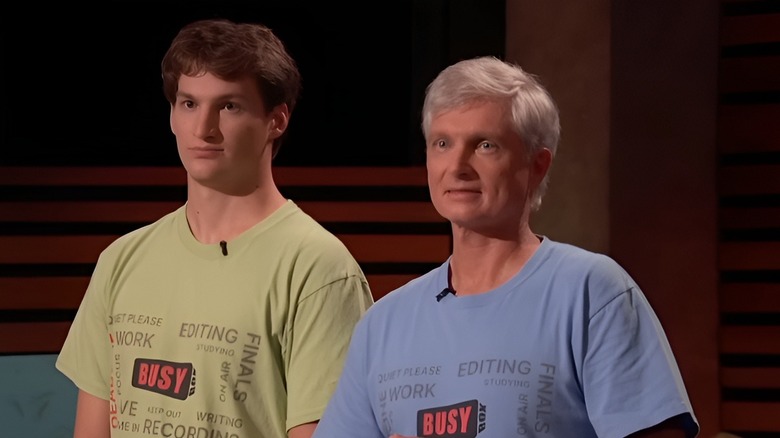What Happened To The BusyBox Sign From Shark Tank Season 13?
Finding ways to maximize your productivity while working from home is a seemingly never-ending battle. With new products coming out every day to aid in this ever-evolving work culture, it should come as no surprise that "Shark Tank" would see its fair share of intrepid entrepreneurs with their own work-from-home solutions. One such pair that appeared on Season 13 of the hit series were Steve Skillings and Connor Smith who pitched the BusyBox Sign, a do not disturb light-up sign made for work-from-home professionals.
In the episode – which aired on April 8, 2022 — the duo excitedly pitched their product to the sharks through an over-the-top and comedic presentation. The sharks got into the entrepreneurs and their energy but were taken aback when discovering the BusyBox's massive $299 price tag. The investors found plenty to admire about the team's sales, backstory, and vision for the company, but ultimately chose not to invest given the cost of the item and an unclear roadmap of how to scale the business.
The idea for the BusyBox Sign came to Skllings in March 2020. While getting accustomed to remote work at the start of the pandemic, Skillings grew irritated by his family constantly barging into his office, especially while on video calls. He initially sought out an "On Air" sign to put outside of his office, but he failed to find one that wouldn't require him to open space in his wall and mess with extensive wiring. From there, he moved forward in creating his own simpler solution and got in touch with a colleague from a prior startup venture to aid in development of what would become the BusyBox Sign.
What happened to the BusyBox Sign on Shark Tank?
Steve Skillings and Connor Smith entered the "Shark Tank" with the hope of receiving a $200,000 investment for 15% of the BusyBox Sign. They kicked off their pitch with an exuberant presentation depicting the interruptions from household members that someone working remotely might regularly experience. The sharks then got to try out some digital BusyBox Signs of their own and see how it worked with the accompanying app, complete with custom graphics tailored to each investor. Skillings explained that these models were the most expensive option due to the customization feature, with their other products containing premade signs that users slide in and out.
The sharks' jaws dropped once they heard that the digital model cost $299. Skillings shared that their intent behind this price point was to ensure that they have a good profit-to-revenue ratio in order to continue advancing their product line and features. At that point, they had done $429,000 in lifetime sales over the course of nearly two years. After diving deeper into his inspiration for BusyBox, Skillings shared his ultimate vision for the business to break into creating more advanced workplace technology as well as working in the wellness space.
Mark Cuban would be the first to go out, disliking the wellness approach. Lori Greiner found that the price was too high and that there wasn't enough need. Robert Herjavec similarly couldn't see the vision for the company. Kevin O'Leary believed there was some market for it but saw no real value in the business itself. Daymond John didn't see the business realistically scaling given the product's high price.
The BusyBox Sign after Shark Tank
The BusyBox team's "Shark Tank" appearance may not have gone as they initially planned, but that didn't mean that their chance of success was lost. Oftentimes, a company's "Shark Tank" segment is followed by a sudden influx of purchases and website traffic. This phenomenon, commonly known as the "Shark Tank" effect, is one of the biggest goals that entrepreneurs seek from coming onto the show, sometimes even more than striking a deal.
This was no exception for BusyBox Sign founder Steve Skillings. In a Q&A section on the company's website posted in March 2023, Skillings shared, "We've been growing since the first airing and continue to struggle to keep up sales for one product, the BusyBox D (BBD). The BBD sells really well even though we struggle to reliably get chips for them. The backorder list is huge." Despite being the most expensive model that the sharks criticized, the BusyBox D (Digital) would be the company's bestseller following its appearance on the show. The team gained even more success after their product was featured in a viral video from influencer Riley Lemon that was uploaded in October 2022.
One factor that Skillings wanted to make clear was the way in which their segment was edited. While what we see on the show for each pitch lasts between six and ten minutes, the actual presentation can go on for up to 90 minutes in some instances. This was the case for BusyBox, although Skillings noted that the editing team eliminated some important information, including discussions regarding the company's less expensive models.
Is BusyBox still in business?
As of this writing, BusyBox is still very active. Four BusyBox models are currently available to purchase that range in price from $69 to $299, including the BusyBox R (Remote), the BusyBox S (Standard), the BusyBox P (Pixel), and the BusyBox D. Other than the BusyBox R, all sign options are compatible with the free BusyBox Sign app that's available on both the iOS App Store and Google Play.
BusyBox also sells a variety of accessories including table stands, special message packs, mounting plates, and stylized covers. The company's products can be found on both its official website and on Amazon. BusyBox also remains active across various platforms such as Instagram, Facebook, and YouTube.
Reviews of BusyBox's selection remain largely positive, although not without some notable criticisms. On Amazon, the BusyBox S remains their highest-rated product with a 4.2 out of 5-star rating average from 111 reviewers. Buyers like its ease of use and installation and playful design, although some have been unhappy with its battery life. A 2022 review from Yahoo for the BusyBox D released on the same day as BusyBox's "Shark Tank" episode was mostly positive, praising the customization options and vibrancy of the screen while finding it difficult to justify the product's $299 price point.
What's next for BusyBox?
While the sharks didn't see much of the vision for BusyBox, that hasn't stopped the company from thriving long after its time on the show. With the work-from-home lifestyle rapidly turning into the norm for countless industries nowadays, the demand for helpful apps, productivity tools, and unique gadgets for remote workers will only continue to grow. Recognizing this ever-growing need, the BusyBox team are continuing to look for new ways to add to this market.
Speaking with Medium in 2022, BusyBox founder Steve Skillings shared his ambitious vision for the brand, stating, "Our smart sign line of products is our first offering and we have a great product roadmap that we feel will help our owners stay focused so they can get more done and have an improved work/life balance. What Fitbit did for exercise, we want BusyBox to do for the productivity and creativity spaces in your life." The company elaborated on this some more the year after on its website, stating that they planned on soon moving past light-up signs and developing more advanced productivity products to integrate into smart homes, although the specifics of these plans has yet to be unveiled.
Along with working full-time as BusyBox's CEO, Skillings works part-time at two entrepreneurial ventures. These include working as Chief Operating Officer at the musical instrument amplifier supplier Sunn Musical Equipment Corp and founder of the consulting firm Inventive LLC.
